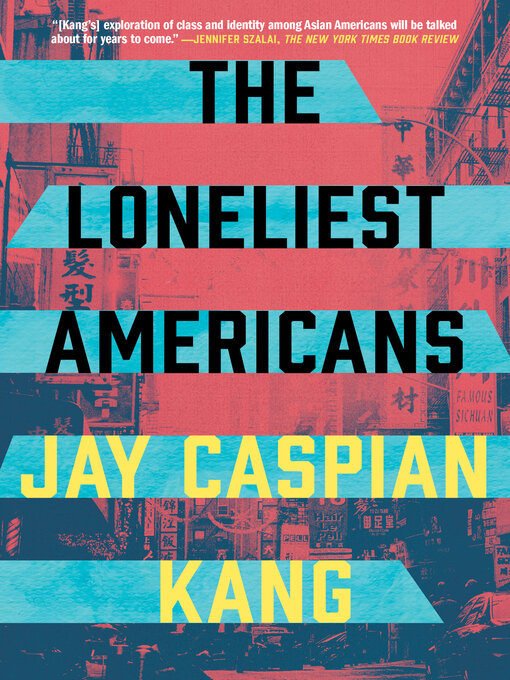“[Kang’s] exploration of class and identity among Asian Americans will be talked about for years to come.”—Jennifer Szalai, The New York Times Book Review (Editors’ Choice)
ONE OF THE BEST BOOKS OF THE YEAR: Time, NPR, Mother Jones
In 1965, a new immigration law lifted a century of restrictions against Asian immigrants to the United States. Nobody, including the lawmakers who passed the bill, expected it to transform the country’s demographics. But over the next four decades, millions arrived, including Jay Caspian Kang’s parents, grandparents, aunts, and uncles. They came with almost no understanding of their new home, much less the history of “Asian America” that was supposed to define them.
The Loneliest Americans is the unforgettable story of Kang and his family as they move from a housing project in Cambridge to an idyllic college town in the South and eventually to the West Coast. Their story unfolds against the backdrop of a rapidly expanding Asian America, as millions more immigrants, many of them working-class or undocumented, stream into the country. At the same time, upwardly mobile urban professionals have struggled to reconcile their parents’ assimilationist goals with membership in a multicultural elite—all while trying to carve out a new kind of belonging for their own children, who are neither white nor truly “people of color.”
Kang recognizes this existential loneliness in himself and in other Asian Americans who try to locate themselves in the country’s racial binary. There are the businessmen turning Flushing into a center of immigrant wealth; the casualties of the Los Angeles riots; the impoverished parents in New York City who believe that admission to the city’s exam schools is the only way out; the men’s right’s activists on Reddit ranting about intermarriage; and the handful of protesters who show up at Black Lives Matter rallies holding “Yellow Peril Supports Black Power” signs.
Kang’s exquisitely crafted book brings these lonely parallel climbers together and calls for a new immigrant solidarity—one rooted not in bubble tea and elite college admissions but in the struggles of refugees and the working class.
-
Creators
-
Publisher
-
Release date
October 12, 2021 -
Formats
-
Kindle Book
-
OverDrive Read
- ISBN: 9780525576242
-
EPUB ebook
- ISBN: 9780525576242
- File size: 1728 KB
-
-
Languages
- English
-
Reviews
-
Publisher's Weekly
September 13, 2021
In this searing treatise, Kang (The Dead Do Not Improve), a writer-at-large for the New York Times Magazine, examines what it means to be Asian “within the narrative of a country that would rather write you out of it.” Through personal anecdote and extensive reporting, he illuminates how, in the United States where, he writes, the racial binary is white and Black, Asians face a “loneliness that comes from attempts to assimilate, whether by melting into the white middle class or by creating an elaborate, yet ultimately derivative, racial ‘identity.’ ” A first-generation Korean American, Kang is refreshingly candid in his analysis, addressing how immigrants who come from Asia lack the intrinsic solidarity that has been foisted upon them—either by American ignorance or well-intentioned, but often misguided, activist efforts. He adds texture to this sentiment by making the historical personal, detailing his experience as the son of two North Korean refugees who moved to the United States in 1979. But his story is secondary to a larger cultural interrogation, as he deconstructs the “blinkered optimism” of the Asian immigrants who came to America after the passing of 1965’s Hart-Celler Act, and scrutinizes the reddit thread MRAZNs (Men’s Rights Activist Azns). This excellent commentary on the Asian American experience radiates with nuance and emotion. -
Library Journal
October 1, 2021
In this latest book, Kang (The Dead Do Not Improve) suggests that to understand the history of Asian Americans, one need only go back to 1968, when the term "Asian American" was created by a group of students in Berkeley. Prior to 1968, Kang writes, there were only "Asians in the United States," whom white Americans largely did not think of as fellow citizens. Kang addresses the history of the Berkeley movement in order to contextualize the construct of Asian American-ness, an identity that he describes as problematic in a country that still looks at race largely in terms of Blackness and whiteness. Kang frames his argument with a first chapter that focuses on his family's migrations from North Korea to South Korea, and eventually to the United States after the passage of the Hart-Celler Immigration Act of 1965. His cultural criticism adds a much-needed perspective to the growing body of literature by the children of Korean immigrants in the United States, including Cathy Park Hong's autobiographical essay collection Minor Feelings. Kang also devotes chapters to his coverage of the Black Lives Matter protests, the online community of men's rights activists, and the "aznidentity" subreddit. VERDICT Kang's book adeptly blends history, memoir, and current affairs in an attempt to make sense of the individual's place in the current map of the United States.--John Rodzvilla, Emerson Coll., Boston
Copyright 2021 Library Journal, LLC Used with permission.
-
Formats
- Kindle Book
- OverDrive Read
- EPUB ebook
Languages
- English
Loading
Why is availability limited?
×Availability can change throughout the month based on the library's budget. You can still place a hold on the title, and your hold will be automatically filled as soon as the title is available again.
The Kindle Book format for this title is not supported on:
×Read-along ebook
×The OverDrive Read format of this ebook has professional narration that plays while you read in your browser. Learn more here.


